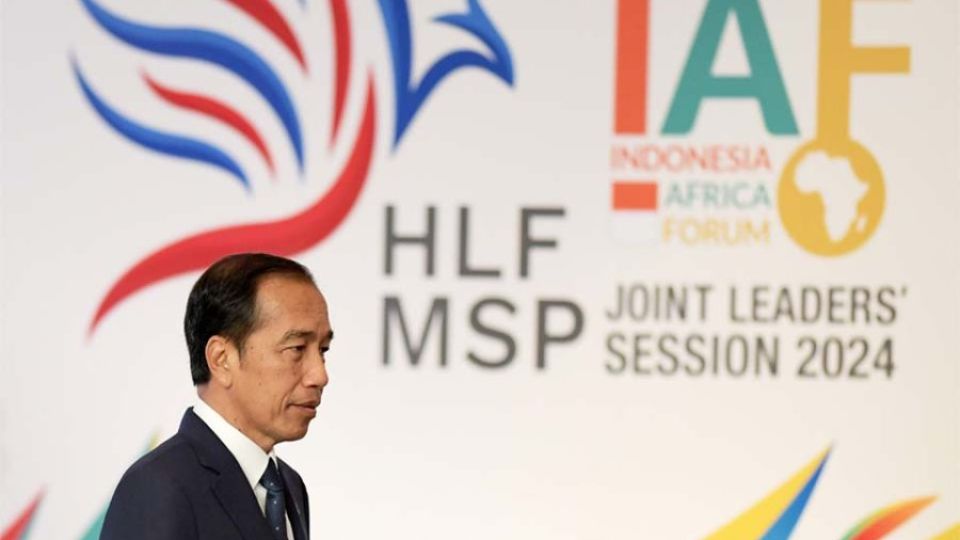September 5, 2024
JAKARTA – One of the major foreign policy achievements that outgoing President Joko “Jokowi” Widodo can proudly pass on to his successor Prabowo Subianto is his ability to maintain and even strengthen a leading role in relations between Asian and African countries, the core members of the so-called Global South, a loose organization of developing nations.
The Global South, which is associated with the 130-member Group of 77 and the 120-member Non-Aligned Movement (NAM), has gained fame and played a critical role during United Nations General Assembly sessions, especially during votes.
Indonesia has consistently been a prominent member of the group and has to some extent been accepted as its informal spokesman. It hosted the Asia-Africa Conference in 1955, the brainchild of the NAM. In 1992, Indonesia hosted the NAM Summit in Jakarta.
Indonesia’s influence and power are strongly reflected by the enthusiastic attendance of hundreds of African participants, from heads of governments to ministers and businesspeople, who came to Bali to attend the Indonesia-Africa Forum (IAF) in Bali on Monday. The attraction of the resort island was no doubt pull factor for their presence.
President Jokowi opened the Joint Leaders’ Session of the High-Level Forum on Multi-Stakeholder Partnership (HLF MSP) and the second IAF, the first forum having been held in 2018. The President reiterated his government’s commitment to playing a leading role in voicing the aspirations and interests of developing nations, which are often sidelined by the rich and industrialized nations.
In his opening address, the President pointed out the pivotal importance of a new direction and vision, a new strategy and new strategic measures, which are pivotal to achieving more equitable and inclusive development for developing countries.
Indonesia has always taken part in global solutions, defended the interests of developing countries and played a role as a bridge builder in the global fight for equality, justice and solidarity. It is inherent in Indonesia’s DNA that it acts as the mouthpiece of developing countries in dealing with industrialized nations.
And, typically Jokowi, he also took pride in the results of the collaboration between Indonesia and the African continent. This year’s IAF recorded business agreements worth US$3.5 billion, six times the figure in the first IAF in 2018.
Next year, Indonesia will celebrate the 70th anniversary of the Asia-Africa Conference and as President, Prabowo will preside over the platinum jubilee of the historic event. It is safe to say the Bali meeting serves as a preliminary preparation for next year’s commemorative summit in Bandung, where giant Asian economies like China and Japan will take part, although they are no longer developing nations.
Indonesian leaders, except first president Sukarno, have always chosen the “middle way”, or constructive engagement, in implementing the country’s “free and active” foreign policy. In our free and active policy, the country always seeks a moderate and collaborative approach, although oftentimes it has taken a bold standpoint too. This approach has proven to be productive.
Economically Africa is becoming more attractive for the global economy and Indonesia should not act alone. By working together with ASEAN, the results will be more concrete and massive in terms of quality and quantity.
Ten-member ASEAN, together with China, Japan, South Korea, Australia and New Zealand have set up the legally binding Regional Comprehensive Economic Partnership (RCEP), one of the world’s major free trade agreements.
In the meantime, the continent also has the legally binding African Continental Free Trade Area (AfCFTA), which has 54 members with a combined GDP of US$3.4 trillion. This free trade agreement will accelerate market access to the Pan-African market.
The RCEP and AfCFTA can work more closely to advance economic ties between the two continents, and ASEAN should take the initiative to make it happen.
Prabowo has made clear his intention to maximize the role and opportunity of Indonesia as a middle power to play a more decisive role in global affairs. Next year’s commemorative Asia-Africa summit will be a good starting point.


